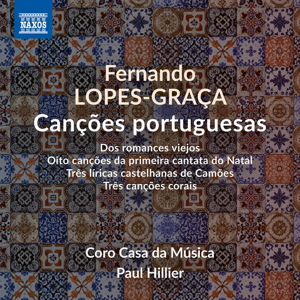
Fernando Lopes-Graça (1906-1994)
Canções portuguesas
Dos romances viejos (1956)
Três canções regionais portuguesas (1970, published 1977)
Oito canções da primeira cantata do Natal (1945/1950)
Três liricas castelhanas de Camões (1954/1955)
Três canções regionais portuguesas (1957/1970)
Três canções corais (1946)
Coro Casa da Música/Paul Hillier
rec. 2020, Casa da Música, Porto, Portugal
Texts and translations included
Naxos 8.574309 [47]
Fernando Lopes-Graça spent much time exploring and studying the folklore of his country, and often based his music on it. He did so in various ways, from the simple, tasteful arrangements to the more searching ways of incorporating folk material in longer works. Portuguese folk music was never far away in his many preoccupations. Sometimes it was the source of large-scale pieces, such as the piano cycle Viagens na minha terra (Travels in my homeland) and its orchestral version.
Some of the choral works here are based on traditional poems, for example Dos romances viejos (Two old romances). Others are folk songs in masterly, attractive arrangements, such as two sets of Três canções regionais portuguesas (Three Portuguese regional songs). Lopes-Graça compiled two substantial Christmas cantatas, also based on traditional songs. Oito canções da primeira cantata do Natal (Eight songs from the first Christmas cantata) are included here. It is a pity that not the whole cantata was recorded but there must be a reason. All the choral pieces based on traditional material are very fine, enormously enjoyable, especially when sung with such gusto and enthusiasm as here.
Two pieces definitely do not belong in Portuguese folk tradition. One of them, Três liricas castelhanas de Camões (Three Castilian lyric poems by Camões), sets texts by the great 16th-century Portuguese poet Luís Vaz de Camões, who also wrote in Castilian, one of the languages of Spain. Lopes-Graça has used his verses in several sets for voice and piano. Some of those settings were once available on PortugalSom SP 4050, most likely a collector’s item by now.
The anodyne title of the other piece, Três canções corais (Three choral songs), conceals the fact that the composer chose to set texts by three contemporary poets, including fellow Communist Party member José Gomes Ferreira, author of the text of the first song here, Rústica. Its tense mood reflects the weariness of the walker (“Oh, my feet are so weary / From jumping through the bush […] for you the sun / For me the dark / For some the soft bread / For others the hard”). The second song, Epitáfio, more straightforward, maintains equally sombre mood (“Even love died / Like any other flower”). The final song brings slight hope and comfort (“Millions settling the reconquered soil”).
Lopes-Graça proves himself the worthy heir of the Portuguese renaissance tradition of Cardoso, de Magalhães and Lobo in his settings of Camões and in these contemporary settings. The latter, with its subliminal political and social content, come from the period of Salazar’s long-lasting dictatorship. This impressive triptych may be one of Lopes-Graça’s most personal statements.
This is a fine release, superbly sung and well recorded. My regret is the rather short playing time, but this must not deter anyone who wants to explore the byways of contemporary music. This is a lovely and enormously enjoyable disc.
Hubert Culot
Buying this recording via a link below generates revenue for MWI, which helps the site remain free.




















